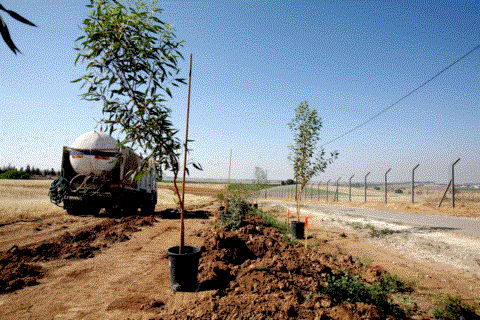5/16/2011
KKL-JNF has recently begun a special project of planting trees around the communities that border on the Gaza Strip, in order to block the terrorist organizations' field of vision and help prevent them from taking aim at the communities and the cars traveling on local roads.
The trees now being planted will enable residents to travel more safely and help stop direct hits by rockets and anti-tank missiles, such as the attack that took place one month ago, when a school bus was hit and 16-year old Daniel Wiflic was killed.
The first stage of this unique project was inaugurated on Tu Bishvat earlier this year. The most significant stage has now begun, which includes planting a twelve-kilometer long boulevard of trees to help protect 11 communities, an average of about one kilometer of trees for each community. Kibbutz Mefalsim was the site of the first plantings, which began immediately after Israel Independence Day, soon to be followed by plantings around the other communities: Hulit, Ein Hashelosha, Nirim, Nir Oz, Kissufim, Nahal Oz, Kfar Aza, Nir Yitzhak, Sufa and Sa'ad. Friends of KKL-JNF throughout the world have already expressed their desire to support this important project.
At the planting of the first saplings, KKL-JNF World Chairman Efi Stenzler noted that a protective wall was being created using trees rather than cement: "This will have a number of advantages - besides providing shade and natural beauty; bees will make honey from the flowers of the eucalyptus trees, so we have a reality here that is both bitter and also sweet. It is my hope that the many countries in which there are KKL-JNF offices will help support this important project."
Most of the trees being planted are eucalyptus, which, according to experts, are good for security for a number of reasons: Eucalyptus trees grow tall and will obscure the villages, they grow rapidly, and it is expected that within about five years they will grow to a height of 8 meters. In only two years from now, they should already be tall enough to help protect the villages and their residents. They blend into the natural landscape, provide shade and are water-efficient. KKL-JNF chose these trees also because honey can be produced from their flowers.
Processes of infrastructures development, fewer open spaces and a drop in the number of fruit tree plantations in the region have led to a significant decrease in grazing areas for honey bees, in terms of nectar distribution and the amount of wildflowers. As a result, the livelihood of local beekeepers was severely affected, which led the Honey Council and KKL-JNF to collaborate on this project.
During the period between Tu Bishvat and Israel Independence Day, experts worked on coordinating plans with local residents and on creating awareness of the importance of the project for protecting the communities. In addition to the first plantings that took place on May 11, at which KKL-JNF World Chairman Efi Stenzler planted an adult tree in the boulevard, more trees will be planted along the main public roads close to the security fence.
Back to articles
|
|
